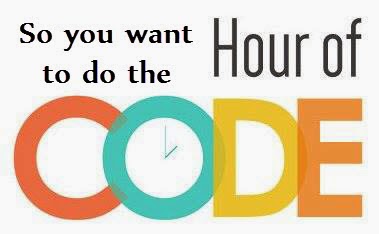What is the Hour of Code?
From http://hourofcode.com/us"The Hour of Code is a global movement reaching tens of millions of students in 180+ countries. Anyone, anywhere can organize an Hour of Code event. One-hour tutorials are available in over 30 languages. No experience needed. Ages 4 to 104."
Who Should participate?
The simple answer is everyone. Code.org's mission is to make coding and computer science visible and accessible to everyone and the hour of code is a glimpse into the wold of programming. They have expanded their offerings this year to include a 20 hour computer science curriculum for grades K-5, and they are introducing new curriculum that connect with math and science at higher grades.Why an Hour?
The hour of code is aimed at getting all kids and teachers to experience what coding can do in the classroom for an hour, but their resources can support much more instruction than this. The hour is about changing perceptions of programming. The videos that accompany the curriculum don't just describe concepts of loops and algorithms, they break down stereotypes about what programming is and what it can do. You can take this much further than an hour.Last year the Hour of Code helped me introduce programming as an instructional mode on my campus.
First you learn to code, then you learn through code -Mitch Resnick creator of SCRATCH
While the hour of code got my kids programming more, I had already introduced most of the to programming in technology class. The transformation took place as their content area teachers experienced coding with them. Until our science teacher saw how SCRATCH could model equations, he never used it in class. This year both middle school math and science classes are using programming to develop their understanding of key concepts.
Where do I start?
Check out the tutorials and videos at Code.org/learn for yourself. Challenge yourself to do an hour of code and see what you learn. Then talk to your school leadership about the opprotunities available to all your students and teachers.What next?
Talk with the other teachers on your campus aboutthe instructional potential of programming, help them design a lesson that connects with their curriculum. Need some help? Drop me a line and let's brainstorm together.Mitch Resnick has said that programming is the next or the new writing. He is more correct than he knows. Not only is it a meaningful mode of expressions, but it is viewed as mysterious and hard to teach and the people best positioned to make it accessible don't know where to start.

Comments